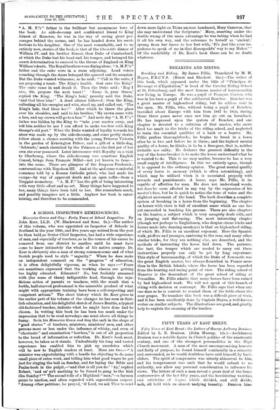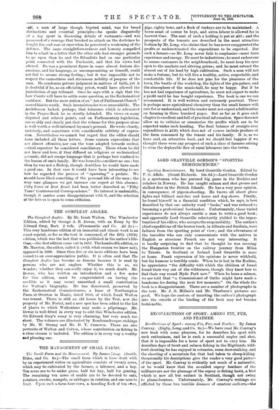FIFTY YEARS AT EAST BRENT.
Fifty Years at East Brent: the Letters of George Anthony Denison. Edited by L. E. Denison. (John Murray. 12s.)—Archdeacon Denison was a notable figure in Church politics of the nineteenth century, and one of the strongest personalities in the High Church movement. A man of the most uncompromising honesty and fixity of purpose, he found himself continually in a minority and surrounded, as ho would doubtless have said himself, by back- sliders. The spirit of compromise was utterly abhorrent to him, and his temperament was such that he would submit to no authority, nor allow any personal consideration to influence his views. The letters of such a man reveal a great deal of the fierce controversies of the last fifty years, and the bewildering varieties and subtleties of dognet which divided, and still divide, mai, all held with an almost undying tenacity. Denison him-
self, a man of large though bigoted mind, was for broad distinctions and essential principles—he speaks disgustedly of a day spent in discussing details of vestments—and was possessed of a courage that brooked no attack on the doctrines he fought for, and rose at once when he perceived a weakening of the defence. The same straightforwardness and honesty compelled him to admit in a letter that the other side had stronger grounds to go upon than ho and the Ritualists had on one particular point connected with the Eucharist, and that his views had altered. He was a prominent figure in some almost furious dis- cussions, and his language, as uncompromising as himself, could not fail to arouse strong feeling ; but it was impossible not to respect the earnestness and strenuous nobility of purpose of the man. He condemns private judgment in matters of faith, yet it is doubtful if he, as an officiating priest, would have allowed the jurisdiction of any tribunal. Once he says with a sigh that the Law Courts will have to settle some question, as the Ecclesiastical could not. But the mere notion of an "Act of Parliament Church " moved him to wrath. Such inconsistencies were unavoidable. The Archdeacon lacked, perhaps, that tolerance which is advocated in the Prayer-Book he so stoutly defended. His views on many disputed and related points, and on Parliamentary legislation, are so ably and clearly put that the volume for this purpose alone is well worth a well-informed layman's perusal. He wrote clearly, incisively, and sometimes with considerable subtlety of expres- sion. Nevertheless we cannot but regret that the editor should have included all these letters. Some contain expressions that are almost offensive, nor can the tone adopted towards ecclesi- astical superiors be considered conciliatory. Those whom he did not ]mow and love, if they differed on religious or ecclesiastical grounds, did not escape language that is perhaps best confined to the bosom of one's family. Hd was bound to conciliate no one ; but then he was not a Bishop, though doubtless he would have made a good one. In that case it would have been interesting to see how he regarded the process of " squeezing" a prelate. We should have liked something of the personal life of the man ; the very rare glimpses we get increase our regret at this absence. Fifty Years at East Brent had been better described as "Fifty Years' Controversial Correspondence." Its interest is undeniable, though it carries some disappointment with it, and the selection of the letters is open to some criticism.



















































 Previous page
Previous page